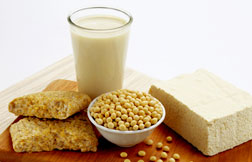Isoflavones
- Numerous reports indicate that, because soy is high in isoflavones, it can prevent illness and promote good health. Isoflavones are a class of phytochemicals, which are compounds found only in plants (phyto means plant).
- They are also a type of phytoestrogen, or plant hormone, that resembles human estrogen in chemical structure yet are weaker. Soy contains many individual isoflavones, but the most beneficial are genistein and daidzein.
- The highest amounts of isoflavones and soy protein are found in tempeh, whole soybeans (like edamame), textured soy protein, soynuts, tofu and soymilk. Researchers recommend consuming at least one to two servings a day. A serving is equal to 1 ounce of soynuts; 4 ounces of tempeh, textured soy protein (cooked), or edamame; or 8 ounces of soymilk.
Benefits
- Heart: Isoflavones show tremendous potential to fight disease on several fronts. They have been shown to help prevent the buildup of arterial plaque, which reduces the risk of coronary heart disease and stroke.
- Cardiovascular: Soy isoflavones have antioxidant properties which protect the cardiovascular system from oxidation of LDL (the bad) cholesterol. Oxidized LDL cholesterol accumulates in the arteries as patches of fatty buildup which blocks the flow of blood, resulting in atherosclerosis. Genistein inhibits the growth of cells that form this artery clogging plaque. Arteries damaged by atherosclerosis usually form blood clots. This can lead to a heart attack if the clot goes to the heart, or a stroke if it goes to the brain.
- Breast and Prostate Cancer: Isoflavones may help reduce breast cancer by blocking the cancer-causing effects of human estrogen. They may also prevent prostate cancer by hindering cell growth. Genistein has been found to hinder breast cancer as well as prostate cancer. Results from a new University of California study show that genistein slowed prostate cancer growth and caused prostate cancer cells to die. It acts against cancer cells in a way similar to many common cancer-treating drugs.
- Healthy Bones: Isoflavones also play an important role in protecting and maintaining strong and healthy bones. Evidence shows that genistein and daidzein prevent bones from breaking down. Independent studies conducted at the University of Illinois and the University of Hong Kong concluded that consuming soy isoflavones can increase bone mineral content and bone density. Another study at the University of Texas suggested that isoflavones may also stimulate bone formation. By preserving bone health, increasing bone mass and inducing bone turnover, researchers noted the potential role of soy isoflavones in preventing, and possibly even reversing, the effects of osteoporosis.
- Menopause: The North American Menopause Society suggests that soy isoflavones can also be a natural alternative to estrogen replacement therapy for relief of mild menopausal symptoms. It may help offset the drop in estrogen and regulate its fluctuations that occur at menopause. Many women have reported a reduction in their hot flashes and night sweats when they regularly consume soy foods, like tempeh or tofu.
References
Source: Gilbert, Monique N., “The Healing Power of Soy’s Isoflavones”, www.fwhc.org/health/soy.htm

